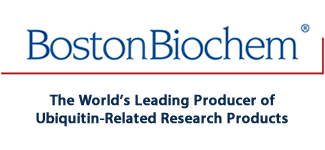

Recombinant Human Ubiquitin Agarose Protein, CF Summary
Product Datasheets
Carrier Free
CF stands for Carrier Free (CF). We typically add Bovine Serum Albumin (BSA) as a carrier protein to our recombinant proteins.Adding a carrier protein enhances protein stability, increases shelf-life, and allows the recombinant protein to be stored at a more dilute concentration.The carrier free version does not contain BSA.
In general, we advise purchasing the recombinant protein with BSA for use in cell or tissue culture, or as an ELISA standard.In contrast, the carrier free protein is recommended for applications, in which the presence of BSA could interfere.
U-400
| Formulation | Supplied as a solution in 20% Ethanol. |
| Shipping | The product is shipped at ambient temperature. Upon receipt, store it immediately at the temperature recommended below. |
| Stability & Storage: | Do not freeze.
|
Reconstitution Calculator
Background: Ubiquitin
Ubiquitin is a 76 amino acid (aa) protein that is ubiquitously expressed in all eukaryotic organisms. Ubiquitin is highly conserved with 96% aa sequence identity shared between human and yeast Ubiquitin, and 100% aa sequence identity shared between human and mouse Ubiquitin (1). In mammals, four Ubiquitin genes encode for two Ubiquitin-ribosomal fusion proteins and two poly-Ubiquitin proteins. Cleavage of the Ubiquitin precursors by deubiquitinating enzymes gives rise to identical Ubiquitin monomers each with a predicted molecular weight of 8.6 kDa. Conjugation of Ubiquitin to target proteins involves the formation of an isopeptide bond between the C-terminal glycine residue of Ubiquitin and a lysine residue in the target protein. This process of conjugation, referred to as ubiquitination or ubiquitylation, is a multi-step process that requires three enzymes: a Ubiquitin-activating (E1) enzyme, a Ubiquitin-conjugating (E2) enzyme, and a Ubiquitin ligase (E3). Ubiquitination is classically recognized as a mechanism to target proteins for degradation and as a result, Ubiquitin was originally named ATP-dependent Proteolysis Factor 1 (APF-1) (2,3). In addition to protein degradation, ubiquitination has been shown to mediate a variety of biological processes such as signal transduction, endocytosis, and post-endocytic sorting (4-7).
Ubiquitin is covalently coupled to agarose beads via primary amines allowing for a fully functional C-terminus. Useful for affinity binding of Ubiquitin-activating (E1) enzyme, Ubiquitin-conjugating (E2) enzymes, Ubiquitin ligases (E3s), Ubiquitin C-terminal hydrolases (UCHs), and other proteins/enzymes that have an affinity for Ubiquitin.
- Sharp, P.M. & W.-H. Li. (1987) Trends Ecol. Evol. 2:328.
- Ciechanover, A. et al. (1980 ) Proc. Natl. Acad. Sci. USA 77:1365.
- Hershko, A. et al. (1980) Proc. Natl. Acad. Sci. USA 77:1783.
- Greene, W. et al. (2012) PLoS Pathog. 8:e1002703.
- Tong, X. et al. (2012) J. Biol. Chem. 287:25280.
- Wei, W. et al. (2004) Nature 428:194.
- Wertz, I.E. et al. (2004) Nature 430:694.
Citations for Recombinant Human Ubiquitin Agarose Protein, CF
R&D Systems personnel manually curate a database that contains references using R&D Systems products.The data collected includes not only links to publications in PubMed,but also provides information about sample types, species, and experimental conditions.
2Citations: Showing 1 - 2Filter your results:
Filter by:
- Reactive-site-centric chemoproteomics identifies a distinct class of deubiquitinase enzymesAuthors: DS Hewings, J Heideker, TP Ma, AP AhYoung, F El Oualid, A Amore, GT Costakes, D Kirchhofer, B Brasher, T Pillow, N Popovych, T Maurer, C Schwerdtfe, WF Forrest, K Yu, J Flygare, M Bogyo, IE WertzNat Commun, 2018;9(1):1162.Species: HumanSample Types: ProteinApplications: Bioassay
- ZUFSP Deubiquitylates K63-Linked Polyubiquitin Chains to Promote Genome StabilityAuthors: P Haahr, N Borgermann, X Guo, D Typas, D Achuthanku, S Hoffmann, R Shearer, TK Sixma, N MailandMol. Cell, 2018;0(0):.Species: HumanSample Types: Cell LysatesApplications: Bioassay
FAQs
No product specific FAQs exist for this product, however you may
View all Proteins and Enzyme FAQsReviews for Recombinant Human Ubiquitin Agarose Protein, CF
There are currently no reviews for this product. Be the first toreview Recombinant Human Ubiquitin Agarose Protein, CF and earn rewards!
Have you used Recombinant Human Ubiquitin Agarose Protein, CF?
Submit a review and receive an Amazon gift card.
$25/€18/£15/$25CAN/¥75 Yuan/¥1250 Yen for a review with an image
$10/€7/£6/$10 CAD/¥70 Yuan/¥1110 Yen for a review without an image
Boston Biochem是泛素相关研究产品的全球领先生产商。自1997年以来,我们的使命一直是为泛素蛋白酶体途径(UPP)研究人员提供创新工具,以促进并加速药物发现的努力。波士顿生物化学专门从事泛素和类泛素(UBL)蛋白(例如Apg8,FAT10,ISG15,NEDD8,SUMO,UFM1)以及相关酶,底物,抑制剂和试剂盒的几种相关产品系列。








